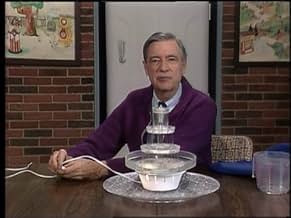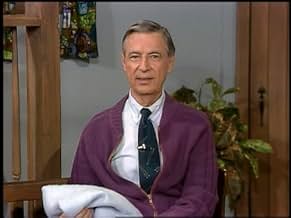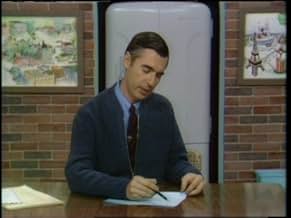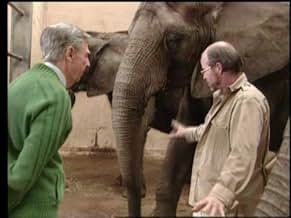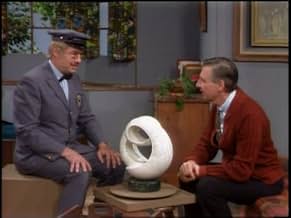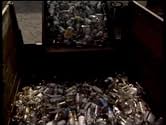Fred Rogers esplora vari argomenti per i giovani spettatori attraverso presentazioni e musica, sia nel suo mondo che nel quartiere di Make-Believe.Fred Rogers esplora vari argomenti per i giovani spettatori attraverso presentazioni e musica, sia nel suo mondo che nel quartiere di Make-Believe.Fred Rogers esplora vari argomenti per i giovani spettatori attraverso presentazioni e musica, sia nel suo mondo che nel quartiere di Make-Believe.
- Candidato a 3 Primetime Emmy
- 8 vittorie e 66 candidature totali
Sfoglia gli episodi
Recensioni in evidenza
The Mr. Rogers you saw pay a television visit to your house was the same Mr. Rogers in real life should you ever have run into him. On the night of writing this we lost Fred Rogers who passed away at the age of 74 years of age. His show took the basics of 1950's TV production and stayed with it even since. It was all about having a conversation with his TV friend. In broadcasting you may speak to many people, but speak as only one person was talking to you.
His first show was the Children's Corner (1953-61) which featured a woman by the name of Josie Carry. Although he got hosting credit, he never appeared in front of the camera, but rather was the puppeteer. The Children's Corner developed most of his puppet characters including Daniel Stripped Tiger, Henrietta Pussycat, X the Owl, and King Friday XIII. The Children's Corner was done live at Non-Commercial TV station WQED in Pittsburgh. It was a fun show if anything, and Josie and the puppets talk about Mr. Rogers a lot.
After Children's Corner he moved to Canada and did a show simply called Mister Rogers (1962-64), and it was first time he was on camera. The show was 15 minutes but it developed something which we know now as the Neighborhood of Make-believe. This Neighborhood was the majority of this short show, but Fred Rogers would appear at the beginning and ending of the program, and he would show off a few things before he had "make-believe" with the viewers. Usually it was some kind of vehicle that takes us to the Make-believe world.
In 1966 Fred returned to WQED and all that he developed would come together and Mister Rogers Neighborhood signs on the air for the first time. Fred wrote and sang shows for the show, and he showed fun things to the audience. His trips to the Neighborhood of Make Believe incorporated storylines about how people (and puppets) no matter how hard they try they should just try to be themselves and deal with live life issues in the fantasy world. Mr. Rogers also took us around the TV neighborhood on soundstages at first but the post 1979 shows took us to actual places in the real world.
Fred Rogers never liked TV for himself, but he knew how to use it to make an impact on people, and impact he did. He did most of the writhing on the show, nobody would dare tell him what to do, not saying they would. I would have loved to meet him myself, but I will never get that chance. He didn't care about being a celebrity. Just someone who cared about people and try to a "neighbor" to them.
Rest In Peace.
His first show was the Children's Corner (1953-61) which featured a woman by the name of Josie Carry. Although he got hosting credit, he never appeared in front of the camera, but rather was the puppeteer. The Children's Corner developed most of his puppet characters including Daniel Stripped Tiger, Henrietta Pussycat, X the Owl, and King Friday XIII. The Children's Corner was done live at Non-Commercial TV station WQED in Pittsburgh. It was a fun show if anything, and Josie and the puppets talk about Mr. Rogers a lot.
After Children's Corner he moved to Canada and did a show simply called Mister Rogers (1962-64), and it was first time he was on camera. The show was 15 minutes but it developed something which we know now as the Neighborhood of Make-believe. This Neighborhood was the majority of this short show, but Fred Rogers would appear at the beginning and ending of the program, and he would show off a few things before he had "make-believe" with the viewers. Usually it was some kind of vehicle that takes us to the Make-believe world.
In 1966 Fred returned to WQED and all that he developed would come together and Mister Rogers Neighborhood signs on the air for the first time. Fred wrote and sang shows for the show, and he showed fun things to the audience. His trips to the Neighborhood of Make Believe incorporated storylines about how people (and puppets) no matter how hard they try they should just try to be themselves and deal with live life issues in the fantasy world. Mr. Rogers also took us around the TV neighborhood on soundstages at first but the post 1979 shows took us to actual places in the real world.
Fred Rogers never liked TV for himself, but he knew how to use it to make an impact on people, and impact he did. He did most of the writhing on the show, nobody would dare tell him what to do, not saying they would. I would have loved to meet him myself, but I will never get that chance. He didn't care about being a celebrity. Just someone who cared about people and try to a "neighbor" to them.
Rest In Peace.
Mr. Rogers was and is a huge positive influence in the lives of small children. His passing away leaves a huge emptiness in the hearts of those who grew up watching him.
In what is all to often a violent and unsure world, Mr. Rogers was the voice of stability and kindness that children could rely on. He always stressed the importance of learning, responsibility, and caring for yourself and others. His kind and gentle demeanor and slow, pronounced way of speaking were absolutely perfect for small kids, making them feel as if they were in the presence of another parent. In fact, Mr. Rogers WAS a kind of third parent to many children, particularly for many during the late 1970s and 1980s, when former at-home mothers were increasingly working outside the home and had less time for them.
Mr. Rogers' greatest legacy was his continuous reminder that he "likes you just the way you are" or "thinks you're great just for being you". This is such an important message for small children who are still forming their ideas about who they are and how they fit into a society that is very often not as kind (and too often, horribly cruel). Individuality and imagination were celebrated gifts.
To this day, I don't have the slightest idea how Fred Rogers came to know children so well, where he got this gift to communicate with them and speak to them on their level. I do know that he is a national treasure who will never be forgotten by millions of people. Mr. Rogers was the ultimate combination of a teacher and a best friend, and is utterly irreplaceable.
In what is all to often a violent and unsure world, Mr. Rogers was the voice of stability and kindness that children could rely on. He always stressed the importance of learning, responsibility, and caring for yourself and others. His kind and gentle demeanor and slow, pronounced way of speaking were absolutely perfect for small kids, making them feel as if they were in the presence of another parent. In fact, Mr. Rogers WAS a kind of third parent to many children, particularly for many during the late 1970s and 1980s, when former at-home mothers were increasingly working outside the home and had less time for them.
Mr. Rogers' greatest legacy was his continuous reminder that he "likes you just the way you are" or "thinks you're great just for being you". This is such an important message for small children who are still forming their ideas about who they are and how they fit into a society that is very often not as kind (and too often, horribly cruel). Individuality and imagination were celebrated gifts.
To this day, I don't have the slightest idea how Fred Rogers came to know children so well, where he got this gift to communicate with them and speak to them on their level. I do know that he is a national treasure who will never be forgotten by millions of people. Mr. Rogers was the ultimate combination of a teacher and a best friend, and is utterly irreplaceable.
Mr. Rogers did what few artists have done in the history of mankind - strengthened and supported his audience so profoundly and so generously that he became a transformative force in their lives. I feel fortunate to have learned from him. In all too many homes, Mr. Rogers was and is the only voice of understanding, gentleness and positive reinforcement. Imagine how different our world would be if more young people could be exposed to his philosophy of acceptance and love.
There are so many children who never hear their parents say the words "I love you" - not once, not ever. And then they hear Mr. Rogers sing of all the ways people say "I love you," like "the cooking way" and "the eating way," and it's a comfort and reassurance beyond words. No other public figure provides this kind of life-changing insight to the people most in need.
On behalf of everyone you helped, of all the souls you touched in a badly damaged world, Mr. Rogers - we thank you, and we love you.
There are so many children who never hear their parents say the words "I love you" - not once, not ever. And then they hear Mr. Rogers sing of all the ways people say "I love you," like "the cooking way" and "the eating way," and it's a comfort and reassurance beyond words. No other public figure provides this kind of life-changing insight to the people most in need.
On behalf of everyone you helped, of all the souls you touched in a badly damaged world, Mr. Rogers - we thank you, and we love you.
10kerose
At age 52, I have fond memories of watching Mr. Rogers' Neighborhood when public television was in its infancy. Fred Rogers not only talked about feelings, but he also addressed young people in a way that respected us as intelligent people in our own right. Sure, he had the Neighborhood of Make Believe, and the entity he referred to as his "television house." The best part is that on one episode he addressed us and said, "Here's why you won't see me in the neighborhood of make believe" and went on to describe how he works with the puppets behind the scenes. In another episode, he shows the studio and how they put the show together.
One memorable episode dealt with Mr. Rogers getting a traffic ticket and going before the judge - he's human, too.
Mr. Rogers always made it clear that it is good to play and to pretend. I strive to be the kind person that Mr. Rogers was - I want to have that same calm demeanor.
Long live Fred Rogers in our hearts. I wish I could have met the man.
One memorable episode dealt with Mr. Rogers getting a traffic ticket and going before the judge - he's human, too.
Mr. Rogers always made it clear that it is good to play and to pretend. I strive to be the kind person that Mr. Rogers was - I want to have that same calm demeanor.
Long live Fred Rogers in our hearts. I wish I could have met the man.
One thing that always bothered many people about Mr. Rogers is that he was not believable. Well, the wild thing is that what you see on TV is what you get in real life.
Fred Rogers is the most soft spoken and kindest person you would ever want to meet. What you get is not fake love like in many of today's kid's shows (Barney, to name the most evil one), but true heart from a man who cares.
Mr Rogers is married, has a son, and his son was a bit of a rebel, but you can't deny the man's love for people. I grew up with him. I'm glad I did.
If you don't believe me, just look at the bloopers from his show (Him setting up the tent is the most famous - all he does is laugh).
Fred Rogers is the most soft spoken and kindest person you would ever want to meet. What you get is not fake love like in many of today's kid's shows (Barney, to name the most evil one), but true heart from a man who cares.
Mr Rogers is married, has a son, and his son was a bit of a rebel, but you can't deny the man's love for people. I grew up with him. I'm glad I did.
If you don't believe me, just look at the bloopers from his show (Him setting up the tent is the most famous - all he does is laugh).
Lo sapevi?
- QuizMr. Rogers always explained to the audience what he was doing when he fed his fish. This was in response to a piece of mail from a blind girl who wanted to know when it happened on each episode.
- BlooperIn the 1979-1981 episodes when Mr. Rogers takes off his sweater and closes the closet door, he'd often close it too fast so it came open a ways, but then the closet door begins to close on its own, as if someone were behind the door pulling it closed.
- Citazioni
Mr. Rogers: You make each day a special day. You know how, by just your being you. There's only one person in this whole world like you. And people can like you exactly as you are.
- Curiosità sui creditiRight before the end credits of "Conflict" #1525, a message appears on screen that says, "And they shall beat their swords into plowshares. And their spears into pruning forks; Nation shall not lift up sword against nation. Neither shall they learn war anymore".
- Versioni alternativeVarious theme-week episodes were released to video in the late-1980s in a special format. For instance, the week of "Day Care and Night Care" (#1516-1520) was released to video under the title "When Parents Are Away", and featured the Neighborhood of Make-Believe segments, edited into new segments featuring Mr. Rogers, as well as old segments like him visiting the day care home. In the old version, Fred meets Mr. McFeely at Brockett's bakery and they go to the day care home together. But in the video version, Mr. McFeely visits Mr. Rogers from Brockett's bakery and they leave from the house.
- ConnessioniEdited into Commercial Entertainment Product (1992)
- Colonne sonoreWon't You Be My Neighbor?
Performed by Fred Rogers
I più visti
Accedi per valutare e creare un elenco di titoli salvati per ottenere consigli personalizzati
Dettagli
- Data di uscita
- Paese di origine
- Siti ufficiali
- Lingua
- Celebre anche come
- Mister Rogers
- Luoghi delle riprese
- Aziende produttrici
- Vedi altri crediti dell’azienda su IMDbPro
- Tempo di esecuzione30 minuti
- Colore
- Proporzioni
- 1.33 : 1
Contribuisci a questa pagina
Suggerisci una modifica o aggiungi i contenuti mancanti

Divario superiore
By what name was Mister Rogers' Neighborhood (1968) officially released in India in English?
Rispondi







